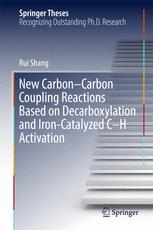

Most ebook files are in PDF format, so you can easily read them using various software such as Foxit Reader or directly on the Google Chrome browser.
Some ebook files are released by publishers in other formats such as .awz, .mobi, .epub, .fb2, etc. You may need to install specific software to read these formats on mobile/PC, such as Calibre.
Please read the tutorial at this link: https://ebookbell.com/faq
We offer FREE conversion to the popular formats you request; however, this may take some time. Therefore, right after payment, please email us, and we will try to provide the service as quickly as possible.
For some exceptional file formats or broken links (if any), please refrain from opening any disputes. Instead, email us first, and we will try to assist within a maximum of 6 hours.
EbookBell Team

0.0
0 reviewsThis thesis presents the latest developments in new catalytic C–C bond formation methods using easily accessible carboxylate salts through catalytic decarboxylation with good atom economy, and employing the sustainable element iron as the catalyst to directly activate C–H bonds with high step efficiency. In this regard, it explores a mechanistic understanding of the newly discovered decarboxylative couplings and the catalytic reactivity of the iron catalyst with the help of density functional theory calculation.
The thesis is divided into two parts, the first of which focuses on the development of a series of previously unexplored, inexpensive carboxylate salts as useful building blocks for the formation of various C–C bonds to access valuable chemicals. In turn, the second part is devoted to several new C–C bond formation methodologies using the most ubiquitous transition metal, iron, as a catalyst, and using the ubiquitous C–H bond as the coupling partner.